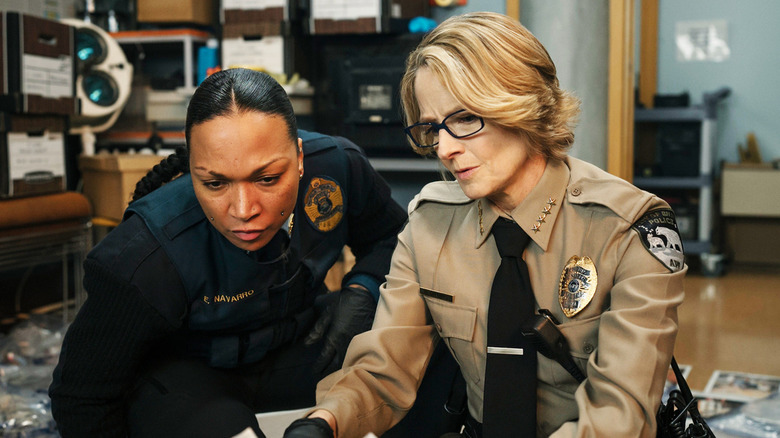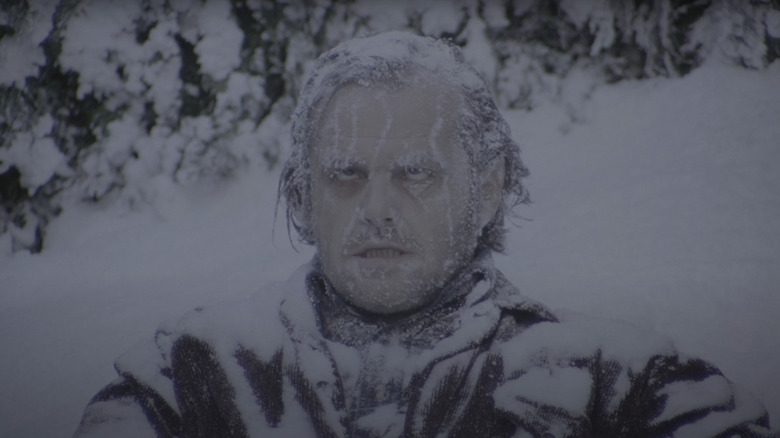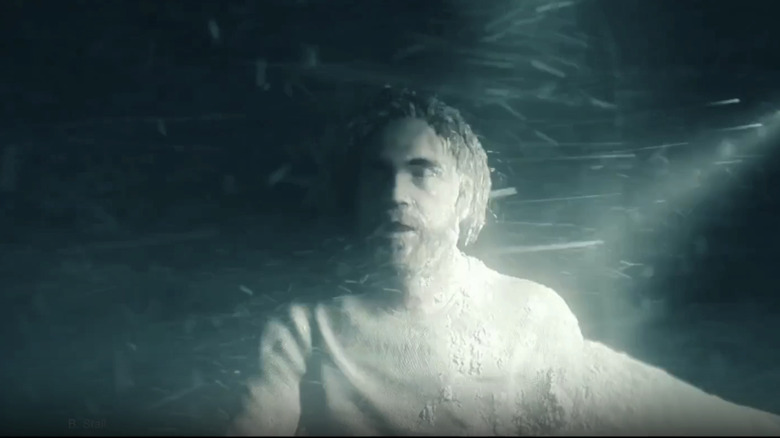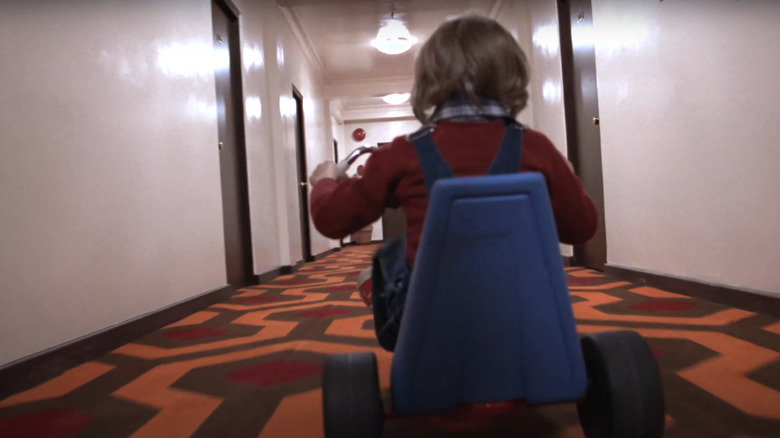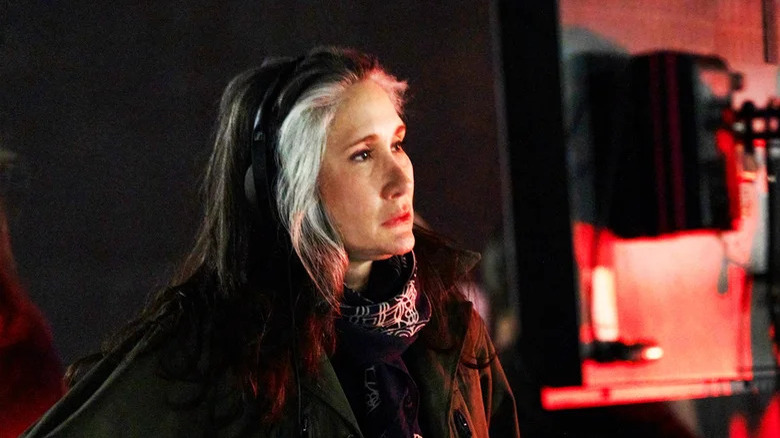The True Detective: Night Country Finale Pays Homage To A Kubrick Horror Classic
This post contains major spoilers for "True Detective: Night Country."
"True Detective: Night Country" isn't afraid to wear its influences on its sleeve. Episode 2 saw new showrunner Issa López borrow directly from David Fincher's "Seven," in which a presumed corpse suddenly wakes up with a jolt, making for the biggest jump scare in the director's 1995 crime thriller masterpiece. In "Night Country," this moment is echoed when the frozen body of a scientist awakens while still immersed in the ice, shocking police gathered around the horrific scene.
But Fincher isn't the only director López borrowed from to create "Night Country" and its eerie, haunting atmosphere. In fact, the fourth season of "True Detective" is notable for its wide array of inspirations, which span everything from John Carpenter's horror classic "The Thing" to the movie that established Jodie Foster herself as a true dramatic force, "The Silence of the Lambs." López also took inspiration from show creator Nic Pizzolatto and his celebrated first season of the crime anthology series, telling the "Kingcast" that she conducted a "deep revision" of "True Detective" season 1 prior to writing "Night Country" and "kept the things that [she] thought were very valuable and were going to make [her] story better." That all amounted to a season of TV that feels very much like a direct sequel to "True Detective" season 1 — which certainly isn't a bad thing.
But the influences don't stop there. With the season finale, López and her team leaned hard into one of the showrunner's other biggest inspirations — Stanley Kubrick's seminal classic "The Shining."
Kubrick is a big influence on Issa López
In a film full of historic cinematic moments, Jack Torrance's death isn't perhaps the most iconic event in "The Shining." That honor perhaps belongs to the twins in the hallway. But there's no doubt the image of Jack Nicholson's character frozen to death is singed into audiences' collective memory. During the film's climactic moments, Torrance — by this point wielding an axe and fully deranged after a winter spent at the deserted Overlook hotel — chases his son Danny (Danny Lloyd) through the hedge maze on the hotel grounds. But the supersensory youngster escapes before his father collapses in the snow and a jump cut reveals his body frozen upright in place.
As it turns out, "The Shining" was yet another big influence on Issa López and "Night Country." The showrunner told The Playlist that she conceived of the Tsalal scientific research station as "feeling a little bit like the Overlook [Hotel from 'The Shining']," adding, "The way the camera moves through it, it's very much, at moments, definitely a reference to Kubrick." What's more, as HuffPost reports, Lopez's father allowed her to watch horror films such as "Alien" and "The Shining" at a young age, discussing the movies in detail with her beforehand. López told the outlet, "I swear to you, I saw those movies in my head before I saw them in cinema. I knew exactly what that woman in the bathtub looked like. And I was like, yeah, I want to see it."
In that sense, "The Shining" influence was always going to show through in "Night Country," considering it was a fundamental building block of López's burgeoning fascination with horror. But nowhere is that influence more clear than in the "Night Country" finale.
The overt and subtle Shining references in Night Country
In the "Night Country" finale, Liz Danvers (Jodie Foster) and Evangeline Navarro (Kali Reis) become trapped at the Tsalal research station during a blizzard alongside one of the previously missing scientists, Raymond Clark (Owen McDonnell). In a sequence reminiscent of Jack Torrance's final moments in "The Shining," Danvers wakes up from a dream and starts searching for Navarro in the deserted station. These scenes, illuminated by a single light source in Danvers' flashlight, recall the eerie shots of Jack lumbering through the hedge maze in "The Shining," lit only by spotlights dotted throughout the fog-covered labyrinth.
As Danvers continues through the empty building, the camera often follows from behind, again recalling the camera work of "Shining" cinematographer John Alcott and Steadicam inventor/operator Garrett Brown as they followed Danny and Jack through the Overlook Hotel's vacant corridors and hedge maze. Of course, in "The Shining," the maze sequence ends with Torrance collapsing before a jump cut reveals that he perished in that exact position, frozen upright.
In "Night Country" Danvers finds her way outside and into the storm, where she discovers Raymond Clark has suffered the same fate as Torrance. Clark can be seen frozen solid in the snow. But unlike his erstwhile Tsalal colleagues who found themselves frozen into the horrific "corpsicle" that made episode 2 of "Night Country" so memorable, Clark isn't sunken into the tundra screaming in agony and fevered panic. Instead, he's sitting perfectly upright in a mound of snow, an incongruously calm expression on his frozen features. This forms a mini tableau that looks almost exactly like that chilling final shot of Torrance.
The Shining is more than just an influence on Issa López
As an aside, it's worth noting that when Raymond Clark is discovered, his eyes are completely frozen over, suggesting he's been blinded by the sub-zero temperatures. Blindness, especially in one eye, is one of the most salient examples of symbolism in "Night Country," representing characters' abilities to interact with the dead and the spiritual realm. Here, both Clark's eyes have been blanked out by the blizzard, signaling his full immersion in the spiritual realm.
This isn't entirely insignificant in relation to why Issa López made such an obvious allusion to "The Shining." That is to say that "Night Country" is a somewhat personal project for López, and the overt references to her inspirations, I think, tie into that. Much like the "Seven" homage in episode 2, the image of Clark frozen in the snow is a pretty unmistakable tribute to "The Shining" when López could have easily just tried to emulate the tone of Kubrick's work and left it at that.
For instance, the showrunner mentioned how certain camera moves were in part inspired by John Alcott and Garrett Brown's camera work in "The Shining." There's also the fact that "Night Country" relies on practical lighting in many scenes, specifically those shot on the ice, which are often illuminated only by the characters' flashlights or headlamps. As Alcott told American Cinematographer, the lights in "The Shining" were "wired as actual practicals. They were part of the hotel." The final sequence in the hedge maze was also, as mentioned, lit using the practical lights fitted in the maze itself. In that sense, "Night Country" does indeed emulate the style of "The Shining," even before the obvious homage to Jack Torrance's demise. So why include said homage?
Night Country and Kubrick are deeply personal for Issa López
As mentioned, "Night Country" increasingly reveals itsef as a pretty personal project for Issa López, who has proven herself to be the perfect fit for the series. The central theme of the whole season has to do with the tension between physical reality and the existence (or not) of a spiritual realm and/or a supervising deity. This comes from López's own experiences being brought up by a Catholic mother and an atheist father. The showrunner has spoken about this on numerous occasions, explaining on episode 4 of the official "Night Country" podcast:
"Danvers and Navaro, Mom and Dad, God and the absence of God live in me and I think that they live in all of us [...] I think that the fluctuation of these two are at the center of who we are. So finding a line that can walk both at the end of the series is part of the mission."
As the HuffPost piece notes, "A smile spread across [Lopez's] face as she shared this memory of her dad reenacting one of the most iconic moments from director Stanley Kubrick's 1980 film." With the showrunner's fond memories of her father introducing her to "The Shining," it seems fair to assume that she wanted to go beyond borrowing techniques from Kubrick and include a direct tribute to the filmmaker and his work. By extension, this doubles as a tribute to her father and her own introduction to the horror that has so significantly influenced "True Detective" season 4.
"True Detective: Night Country" is now streaming on Max.
